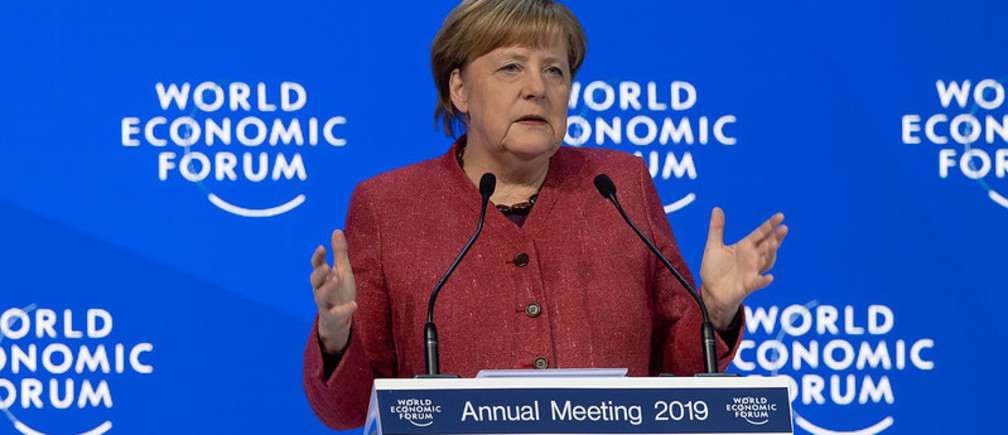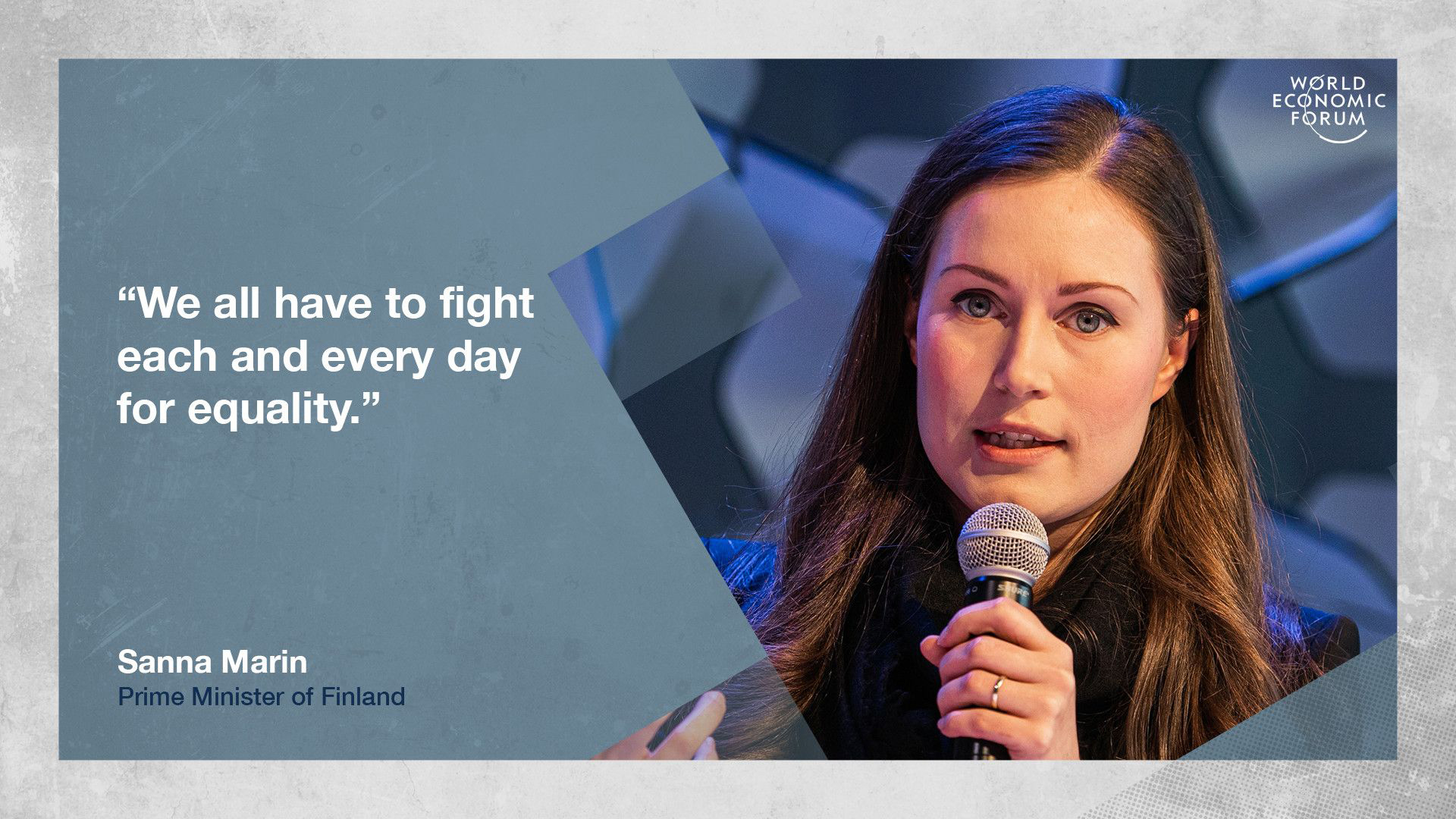Davos Digest 2020: Issue Three
Look at the colleague sitting next to you, and rate how important they are on a scale of one to seven. Then tell them.
Awkward, right?
Well, yesterday we learned that WEF organisers secretly categorise their elite delegates numerically from one to seven based on their “position level.” To be a ‘one’, think top executive or head of state. Two? Senior executive or prime minister. Feel then for poor Ivanka Trump who was apparently a ‘seven’. Her dad should have a word.
A definite ‘one’, Germany’s Angela Merkel was Thursday’s most anticipated speaker, and her twelfth special address at Davos did not disappoint. In a wide-ranging speech, Merkel touched on relations with Africa, her thoughts on the 2015 migration crises and the current conflict in Libya. She also urged Europeans to take action on climate change, because failing to meet emissions-reduction goals could be a “matter of survival” for the continent.
The climate crisis is undoubtedly the focus of this year’s Davos, but it’s not all bad news. Or maybe it is? This year’s WEF Global Risk Report predicts that economic and political polarization will rise this year. Meanwhile WEF’s Global Gender Gap Report told us that gender parity won’t be reached for 99.5 years. And Oxfam’s Time to Care report, released this week, calculates that the richest 2,153 people controlled more money than the poorest 4.6 billion combined in 2019.
Admitting we have a problem is the first step, right? That, and planting a trillion trees. Now, let’s get to the news…
They protect, they attack, but most importantly they use Davos to claw precious votes back

Angela’s discerning reMerks: Freed from the shackles of her obstructive coalition partners back home, Merkel held no punches in her headline address. In keeping with the Forum’s theme, the German Chancellor praised the ‘impatience’ shown by young climate activists and – interestingly – warned of the ‘enormous tensions’ that the battle against climate change will create between rural and metropolitan areas.
Domestic bliss miss: It’s been a week to forget for Guiseppe Conte. The Italian PM must have been looking forward to a respite from Italy’s brewing political crisis and preening his feathers on the international stage. That was, at least, until the country’s foreign minister and leader of the populist Five Star Movement, Luigi Di Maio resigned – leaving Conte with no choice but to cancel his trip to the slopes. At least there’s some skiing in Northern Italy eh, Guiseppe!
You’re the Juan that I want: Venezuelan politician (and self-declared president) Juan Guaidó has been keeping busy perusing panels and schmoozing secretaries of state (see Dominic Raab’s declaration of ‘support’ two days ago) for international endorsements. All his work came to a head yesterday, when he told delegates that the international community needs to ‘bear pressure’ on Maduro’s ‘criminal dictatorship’ and met with Tony Blair, who has since pleaded for ‘focus’ from the West.
Making globalisation work for everyone
To sustainability and beyond: In a welcome departure from the usual Davos bravado, IMF manager Kristalina Georgieva told the audience of her insomnia after the UN’s 2018 IPPC report gave us just 12 years to save the planet. Speaking in conversation with Georgieva, BlackRock’s Larry Fink sounded a more hopeful note, explaining that the financial sector is beginning to change for the better.

The importance of inclusivity: With the catchy title of ‘Minister of Small Business, Export Promotion and International Trade’, Canada’s Mary Ng argued that globalisation must become more inclusive. In a challenge to the audience she said that countries should no longer be considered groups in isolation. Instead we must see them as an amalgam of varying identities. Women, young people, and indigenous groups: they can’t be left behind.
Looking ahead in business: Olivier Schwab, WEF managing director and son of WEF founder Klaus Schwab, takes to the stage to examine how business leaders can balance social engagement with financial growth.
Inclusion means everyone

Guns don’t kill people, people do? Will.i.am and Davos’ youngest speaker Naomi Wadler took to the stage to navigate the highly emotive subject of gun violence. The solution? Background checks, tighter regulation and education. Speaking with the kind of wisdom we’d only expect from a seasoned sage, 13-year-old Wadler said inclusive education is the key to addressing inequality: “If we only teach a child about one way to live, about the white scientists and the white politicians, they’re not going to grow up and respect the black ones. Education is flawed.”
Breaking the doors open… Speaking on the Disability Inclusion panel, award-winning activist and humanitarian Edward Ndopu argued that we must go beyond infrastructure to focus on outcomes. Allegorically speaking he said “A ramp is an output. Being able to be treated with dignity inside the building is an outcome.”
Are you unconsciously biased? The just-dropped Global Gender Gap Report 2020 told us that gender parity won’t be attained for another century. But rather than despair, we collected a few pearls of millennial wisdom from Finland’s newly elected Prime Minister Sanna Marin. According to the 34-year-old, true choice for men and women can only come when they’re released from the shackles of their stereotypes. Unconscious bias often means that we seek similar-looking, like-minded people – something every business needs to be aware of.
Looking ahead in youth & culture: Digital technology has shaped a generation of young people, but does the internet need to put on the kid gloves? We’ll be tuning in to a panel on Digital Safety for Youth.
In data we trust?
Whose AI is more ethical? Microsoft CEO Satya Nadella clearly recognised the dangers highlighted by historian Yuval Noah Harari on Tuesday regarding the current US-China trade rivalry. Attempting to assuage fearmongering about how it might affect the traditionally buoyant tech sector, Nadella said that “China cares as deeply about AI ethics as the US”. While some eyebrows were raised, you can’t fault him for keeping an open mind.
Copy and paste: In a discussion about Building Trust in Data Flows, Věra Jourová, Vice President of the European Commission for Values and Transparency, discussed the Cambridge Analytica scandal and the need to have greater integrity around data privacy and usage. She suggested the US and other trading partners would do well to copy and paste the high standards the EU has adopted through GDPR.
Not so fast, Europe: How optimistic are you about the future of tech governance, on a scale of 1-10? Three smart people in Davos were asked that question, and the response was a resounding “meh”. Canadian Minister of Innovation, Navdeep Bains, offered a six, repeating once again that we need to restore people’s trust in the regulation of technology. Australian National University Professor of Anthropology, Genevieve Bell, gave a three: she felt the 21st century couldn’t escape the problems of the 20th, despite all the new technology. Bradford L. Smith, President of Microsoft, gave another dismal three, but rated Canada as doubly successful on a six. Very smooth, given his company on stage.
Looking ahead in tech: Today we’ll see more discussions on keeping the kids safe online, ‘Investing in the Digital Frontier’, and an intriguing little panel session titled “What Will Happen When Humans Become Cyborgs.” If we survive, we’ll let you know how it goes tomorrow.
When tech takes over
Imagine Dr. House from that TV show, but even more emotionally unavailable. And also, he’s a robot. Lisa Sanders, Associate Professor at Yale Medical School and the inspiration behind hit TV show House, questioned whether ‘robot doctors’ would ever be able to replace the real thing. Professor Jodi Halpern of Berkley declared that patients are unlikely to trust medication prescribed by AI. Would you?
Faking it with Dr Google: Professor Sanders popped up for a second time to discuss pseudoscience and why fake science is ‘winning’ online. Renowned theoretical physicist Robbert Dijkgraaf likened the 21st century tendency to seek medical advice online to ‘16th century spam’, describing the complexities around pseudoscience as having the same level of impact on our lives as climate change. Career fact checkers will be popping corks if these comments turn out true.
Looking ahead in healthcare: The final healthcare talk will look at breakthroughs in cancer care including how early detection and treatment has seen cancer death rates fall over the past 30 years.
Congrats, you made it! Our final update will be shared this afternoon, keep an eye on our social channels for it!
Find Out More
-
Platinum CMS Award
March 13, 2024
-
Changing Communications Tack at Mobile World Congress
February 21, 2024


